This police station in Panna district mentors youth, protects women and prevents alcohol abuse
Brijpur station in-charge BS Thakur prepares students for competitive exams in his free time and pedals to villages to create awareness on alcoholism Panna, Madhya Pradesh: Chitter-chatter of children fills the air as one enters the premises of Brijpur Police Station located 29 km from district headquarters Panna. Step inside and you might see the station in charge himself mentoring students when they aren't in self-study,The brainchild of Sub-Inspector Bakhat Singh Thakur, Vidyadaan is a free coaching institute-cum-library located on the old police station premises of the tribal-dominated village. As part of the community policing initiative, this and several other measures to bring down crimes, ensure women and family welfare and much more have earned it the recognition of being the first ISO-certified police station in the Bundelkhand region a year ago.It all began in 2021 when Brijpur station got a new building and Thakur joined there. Figuring out a new purpose for the old station located just a few metres away, Thakur took steps to launch Vidyadaan which has been beneficial to over 350 students so far.After school, children attend free services at the coaching centre and make use of the library. Though Thakur volunteers during his free time, students are generally encouraged to study on their own, read books and work together as a group. They also get information and reading material on competitive exams such as Jawahar Navodaya Vidyalaya Entrance Exam, Patwari Selection Test, MP Police Constable and Civil Services among others.“We receive good books, study material and guidance from Thakur sir. Due to this, I was able to crack the Navodaya entrance test,” student Avni Trivedi told 101Reporters. Incidentally, four students of the coaching centre got selected last year to attend Navodaya Vidyalaya, a chain of residential schools for gifted rural students.Anshul Ahirwar said he learnt about several new courses and improved his general knowledge by utilising the books at the library. Naman Vishwakarma claimed that preparation for exams has become easy.Seeing the positive effect of the library on children, social workers and residents voluntarily donated cash, books, pens, study material and chairs for students. Thakur himself incurs the extra expenses.Thakur is no accidental teacher. Before joining the police force in 2013, he worked at Bedri Primary School in Chhatarpur district from 2001 to 2004. He became the village head of Shivrajpur in 2004 and returned to teaching after completing his term in 2009.Sub-Inspector and Station-in-charge Bakhat Singh Thakur (Photo - Naresh Kumar Mishra)With the coaching centre becoming a hit among students, further efforts were made to ensure their overall development by turning nearby vacant lands more productive. There are about two hectares of open land in the police station premises, where sports activities, gardening, agriculture etc. are encouraged.Such activities not only hone the sports skills of students but also keep them away from anti-social activities. A meditation centre also functions here. Class 10 student Namrata Patel claimed both intellectual development and sporting excellence were possible now. “We take a stroll here every morning and evening and collectively participate in sporting activities. It feels great,” said villager Pankaj Gupta, who is all praise for Thakur’s initiatives.Thakur also ensures that children who pass through the library become aware of addiction, crimes in society, gender sensitivity, moral values, sanitation and hygiene among others. Special care for the needyOffering visitors a pleasant experience is a priority at the new building police station. The child welfare officer’s room has an assortment of goodies, including biscuits, chocolates and milk, to make interaction with minors easier. “Each and every visitor is like our family. We are always ready to listen to them and provide the necessary guidance. Our aim is to prevent crimes against children,” said Assistant Sub-Inspector Rakesh Singh Baghel, who looks into matters related to child welfare.This room doubles up as a help desk for women. “The idea is to provide an encouraging and comfortable atmosphere for women to voice their issues. We listen respectfully and give them legal education. This has earned us the trust of the local women and more of them come to lodge complaints or seek advice now,” said Constable Shikha Shukla, who works at the women’s help desk.Women also get valuable information about their rights and the government-run welfare schemes aimed at them. The station is a non-smoking area with seating arrangements and a drinking water facility made available for visitors. There is a senior citizen’s room where the elderly can voice their grievances.Constable Shikha Shukla (above) and Assistant Sub-Inspector Rakesh Singh Baghel (below) head the women's help desk and child welfare desk respectively, working to solve and prevent crimes against women and children (Photos - Naresh Kumar Mishra, 101Reporters) The direct result of building trust and community policing is the reduction in the crime rate in Brijpur station limits. As many as 45 villages come under the station with around 1,000 people residing in each village. In 2020, 324 criminal cases were reported, which dropped to 206 in 2021 and 185 in 2022, as per the data provided by the officers.Focus areasAlcohol abuse, missing kids and road accidents were the biggest issues in the station limits. Thakur himself went pedalling a bicycle to villages to create awareness about the ill effects of alcohol. A public awareness campaign is also being run in the station area as police believe that even a slight reduction in alcoholism can result in a corresponding reduction in the crime rate.To prevent the trafficking of minor girls (about 25-30 such crimes would be reported annually at the station, which has now decreased to 12-15 each year), the police launched an initiative to interact with vulnerable tribal communities where girls are at a high risk of being trafficked or cheated. After analysing such instances and figuring out the communities in which its occurrence was prevalent, the police team held a series of interactions with the community members.A traffic awareness campaign was launched to tackle the challenge posed by road accidents, and eye tests were conducted for drivers. A helmet bank opened at the police station to provide protective gear to villagers against a small security deposit. Once the helmet is returned, the deposit is refunded. It also serves the police officers on their beats.(from left to right) The helmet bank at the station; the ISO certification the station received last February; A community garden on the premises (Photos - Naresh Kumar Mishra, 101Reporters)Despite their busy schedule, police personnel also find time to nurture a community garden on the station premises by employing organic farming methods. While police families are the main consumers of the vegetables and fruits produced, any surplus yield is distributed among the residents.“This police station has become a matter of pride for us. It is so peaceful to visit here and experience moments of joy among the trees and plants,” said Rahul Jain, a villager. Cover Photo: BS Thakur with some of the students at Vidyadaan (Photo - Naresh Kumar Mishra, 101Reporters)Edited by Tanya Shrivastava
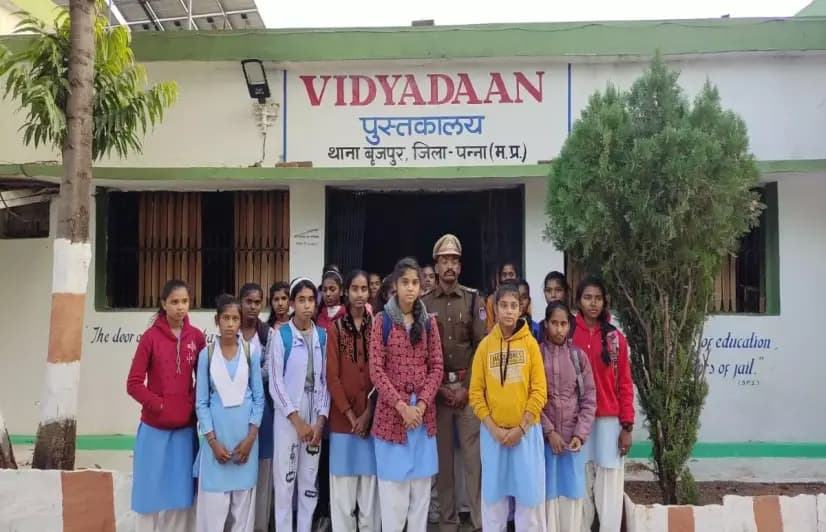
A superstition-fueled incident in Damoh has raised concerns about the violation of child rights
As videos emerged showing a group of young girls paraded naked around the village as part of a prayer for rains, the local administration took cognizance of the matter and launched an investigation. Damoh: Earlier this month, the local administration in the tribal-dominated Jabera block of Madhya Pradesh’s Damoh district flew into action after videos emerged of minor girls who were stripped naked and made to go around the village [name withheld] balancing a long pestle on their shoulders. It emerged that the women in the village had done this to their own girls in adherence to a bizarre tradition calling for rain. The area is facing drought as their paddy and other crops are starting to dry up. The women sang hymns to apparently pacify the angry Indra (a Hindu deity associated with rain) as they walked to the temple Kher Mata where they applied cow dung onto the idol. They believe these actions will usher in rain. The district administration took cognizance of the matter and started an investigation into the incident with the involvement of the District Collector of Damoh, local police, Child Protection Department, District Child Welfare Committee and Women and Child Development. The team visited the village and recorded the statements of the women seen in the videos to ascertain if the girls had been coerced into doing it. They were counselled against following superstitious practices like these that are damaging to the children.“We are investigating the issue. If any kind of coercion has been done in it or if a complaint comes to the fore, then legal action will be taken,” Damoh Superintendent of Police DR Teniwar had said at that time. The station-in-charge at Jabera had been directed to file a report, according to Shivkumar Singh, Additional Superintendent of Police, Damoh. The National Commission for Protection of Child Rights had also expressed concern over this incident and called for a complete report from the collector.In these hinterlands of Bundelkhand, many such regressive superstitions exist and are perpetuated in the name of tradition. Frogs are married to each other or women plough the field naked - all so that the gods may be pleased and shower some rain on this drought-struck land. S Krishna Chaitanya, the District Collector of Damoh had said that they were treating this particular case very seriously. “If any such information or news comes from anywhere that the children have been forced to do this, or have been done by any other person, then action will be taken as per rules,” he said. “Apart from this, if there is any violation of the rights of the children, then we are ready to take action on that too.” The investigation team from the district administration speaking to the villagers about the incident (Picture sourced by Naresh Kumar Mishra)The district administration, embarrassed by this incident, has stepped up awareness camps in the village warning people against indulging in such superstitions. “This is an evil practice and to end it, we will work on creating public awareness and efforts will be made to stop such practices with the help of NGOs and other organisations,” he said, warning that action will be taken against those who spread the videos and reveal the identity of the children.A month hence, a case has been registered prima facie against the family members of minor girls under various sections related to sexual offences against children. Along with this, the police have also registered a criminal case against two other people who revealed the identity of the minors through photos and videos following the incident.
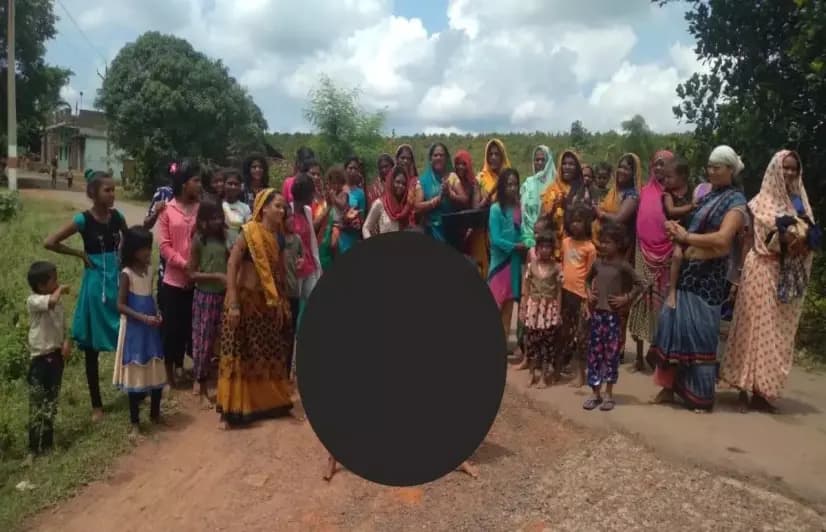
Rumours impede vaccination drive in Damoh
Damoh: Rumours and misconceptions prevailing among the largely illiterate rural population in the Bundelkhand region of Madhya Pradesh are impeding the COVID-19 vaccination programme. The situation is particularly serious in the villages of Damoh district, where health workers are being abused and prevented from administering anti-Covid vaccines.The vaccine challenge is a major concern here, since it is compounded by the general reluctance of people to wear masks or maintain social distancing.The sight of health workers has villagers run helter-skelter, or else, abuse and attack them. “People fear they will get sick and die after taking the vaccine. Out of a population of 650 people in our village (Prempura), only 10 -20 people have taken the vaccine,” Prempura Kendra Anganwadi worker Reena Vyas told 101Reporters. She has been repeatedly trying to persuade them but in vain. The situation is not too different in Choraiya village either, where, to quote Anganwadi worker Maya Khatik, “people fear the vaccine will bring on a fever. The very mention of the vaccine has people banging their doors shut. They have warned officials from entering the village, and threaten to use violence to drive them away should they venture to vaccinate them. We are unable to persuade them otherwise. This has seriously affected our targets.”Locals are even opposed to getting themselves tested for the virus. Officials cite the villages of Prempura, Hinota, Gasabad, Bardha, Patan, Patha, Pali under Hatta Civil Hospital as particularly challenging. Opposition to the vaccine programme is driven by women, and those in the 45- plus age group, although the younger generation remains reasonably well-disposed to getting injected.Auxiliary nurse cum midwife (ANM) Parvati Patel singles out six villages in Damoh district in this regard. “The fear is not just confined to anti-Covid vaccines, but other vaccines as well, which is worrying.” This has prevented several government-run immunisation programmes from taking off, with many infants, including those who are severely malnourished, not getting immunised against many debilitating diseases.In its zeal to stem the rising cases of COVID-19, the government had organised ANMs, ASHA and Anganwadi workers through its network of primary health centres (PHCs) to undertake the responsibility of injecting the vaccine to rural populations in the state. But opposition from locals has negated the efforts of the government.Admitting to the problem, Block Medical Officer, Civil Hospital (Hatta) Dr RP Kori told 101Reporters that target fulfilment had been badly affected in the Gasabad and Hinota village centres under Hatta Civil Hospital due to local opposition to the anti-Covid vaccine. However, a strategy is in the process of being worked out with the help of the Village Employment Secretary and others. “Discussions are on to link the vaccine with other government schemes operating in rural areas,” he said.
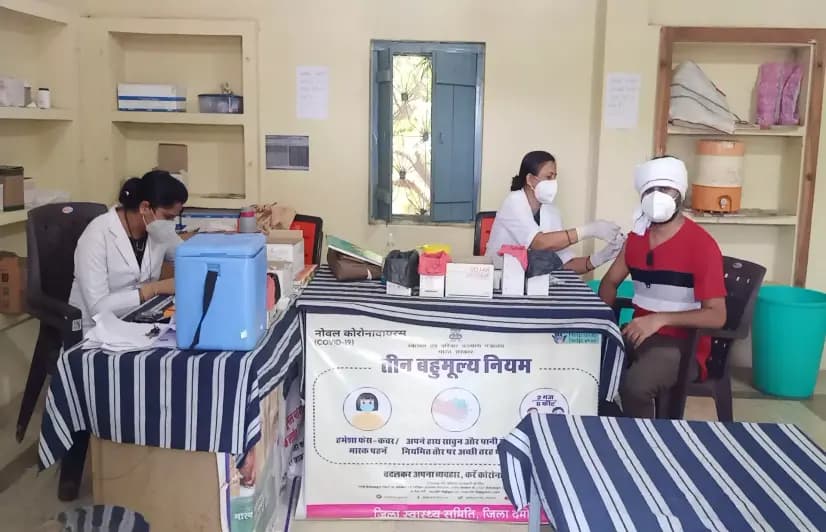
Bureaucratic lapse denies PMAY benefits to Hatta's poor
After being left out of a survey conducted ten years ago, the benefits of the Centre's flagship housing scheme for the poor has eluded the residents of these 15 villages in Madhya Pradesh's Damoh district.Hatta, Damoh: Sangeeta Gond of Dhula village, under Amjhir gram panchayat in Hatta Block of Damoh district of Madhya Pradesh, lives in a kuccha tapri made out of grass, twigs and slates. So do the 200 other households in her village.Manakpura village under Naryanpura Gram Panchayat has hardly fared any better. All the 35 houses in Manakpura are kuccha tapris, informed Mukesh, a tribal resident from the village. The same is the case with residents of villages falling under the Bacchama gram panchayat, where not a single household has received a pucca house under the Pradhan Mantri Awas Yojana. In Lakhan Sen’s village, only three people of the 60-70 households have benefitted from the scheme. Tapris in place of pucca HomesThe tapris are kuccha homes, which leave the residents vulnerable to percolating rainwater, and poisonous reptiles and insects. They are, at best, shelters from the burning heat, freezing cold and rain. Bureaucratic lapses have prevented the primarily tribal population of Hatta benefiting from official largesse under the Pradhan Mantri Awas Yojana, that entitles them to pucca homes.In 2015, the Pradhan Mantri Awas Yojana was announced to provide pucca houses to the economically weaker sections in rural and urban India. But the benefits of the scheme continue to elude the villagers of more than 20 tribal villages under the Bachchama, Choraiya, Garreh, Kuluakala, Bacchama, Narayanpura, and Amjhir gram panchayats, even as the government makes promises to provide dwellings to all by 2022.The situation has left villagers like Suhagrani Singh of Udaipura village under Bacchama gram panchayat baffled, while making the likes of Ram Singh Gond angry and resentful. It is not as if the people have not been demanding their rights to pucca dwellings. But whenever approached, “they tell us that the scheme has not come,” Nannu Adivasi, a tribal leader and elder resident of Manakpura village under Narayanpura gram panchayat, told 101Reporters. Khalak Singh from the same village echoed his sentiments. "It is these bureaucrats and their style of functioning that has prevented us from availing of a single pucca house in our village.” Official explanation for the lapseAlthough local BJP MLA PL Tantavay had gone on to raise the issue on the floor of the Vidhan Sabha, the ruling BJP government in power has failed to resolve this. During elections, candidates regularly meet the people here and promise a solution to the problem. However, as villagers pointed out, they just disappear after garnering the necessary votes to come to power.Made out of grass, twigs and slates, these houses barely afford any protection against the elements (Picture credit: Naresh Kumar Mishra)Meanwhile, officials blame a flaw in the survey for eligible beneficiaries in Damoh district being denied houses under the scheme. A total of 15 villages from six gram panchayats were left out of a survey done in 2011, resulting in not a single beneficiary from any of these villages being included in the list, Hatta Chief Executive Officer Vratesh Jain told 101Reporters. “We are trying to prepare the data by including all the eligible beneficiaries in the housing plus scheme,” he said.According to him, 174 beneficiaries in Manpura village in Kuluakala, 117 beneficiaries under Garreh, 302 beneficiaries from Choraiya, 471 beneficiaries from Bacchama, 307 beneficiaries from Ghogra and 252 beneficiaries from Amjhir have also been included in the updated list. The new action plan includes villages where very few houses have been built under the Pradhan Mantri Awas Yojana. “It is our hope and effort that by 2022, the people can be given the benefits in keeping with the plan and purpose of the government,” Jain said.

Tribals from this MP village risk their lives every day for water
Severe water scarcity is forcing tribals in Damoh's Hatta block to defy the lockdown even as they set out on a dangerous journey each day in search of water. Damoh: On a warm morning, Rakesh Singh walks up a jagged valley bristled with stones, carrying up a kuppa (a spherical vessel) full of water on his head. It was only 8 am, but the sun is already blazing. As sweat trickles down his forehead, the young farmer — a Gond tribal — takes off his blue checked shirt and continues ascending the valley, pacing his speed with each step as the rocky ground below his bare feet starts to heat up. He is not the only one on this arid route. Unmasked and oblivious to the threats of COVID-19, several villagers from Ghoghra — a small hamlet with a population of around 500 in the Hata block of Madhya Pradesh’s Damoh district — have been making this difficult trip just to fetch water. “There is currently no water supply in the village. The nearest source of water is almost 1.5 km from our house,” states Ramesh. The source is a 10-feet deep well lying below the Amkhua valley, situated in the buffer zone of the Panna National Park.In search of water, many families, particularly women and young children of Ghoghra, leave their village in the morning, as early as 6 am. With temperatures soaring to above 40 degrees in the summer, early mornings are the only suitable time for the villagers to make the trip down a craggy stairway in the valley dotted with bare trees.The water from the well is used not just for drinking but also for cooking, bathing and washing clothes. The climb back is more challenging. Many women carry as many as three containers of water and washed clothes on their heads. This arrangement for water takes about 2-4 hours every day and puts the villagers at risk of accidents. “This is dangerous terrain. Several people fall and sprain their ankles,” states Vikas Yadav, a 28-year-old farmer from Ghoghra. The village is home to the Gond tribal community and is located about 70 km from the district headquarters of Damoh, which is much more equipped with basic facilities. It also lies on the fringes of a dense forest. Animal-man conflict is thus, not uncommon. “The area under the valley belongs to the forest department. There are many predatory animals including leopards, wild dogs and bears,” states Surendra Singh, as he prepares to fill water in his kuppa. A farmer in his mid-twenties, Singh echoes the dangers of the valley and adds that people must walk up very carefully to avoid accidents and animals. Villagers of Ghoghra have been making this journey for water for several years. Many hand pumps haven't been working due to low groundwater levels in the region. Three years ago, a solar-powered borewell was installed in the village. However, due to machine failure in early 2020, it has also been inoperative.“Every day, we have to fetch water on foot. We are not tired of complaining, but there is no one hearing,” says Kavita Devi as she ascends the valley carrying a big pot of water on her head. Surendra Singh validates this. He states, “We demanded water facility in our village. But no hearing has been held. The motor in the bore machine is also not working.” Ghoghra village Sarpanch Darelal Ahirwar refused to comment on the record about these claims. But there is no denying that the families of Ghoghra are suffering due to the negligence of the Panchayat.Several officers are not attending office due to COVID-19 restrictions. So on-site inspections for these issues are not happening properly, says Virtesh Jain, CEO of the Janpad Panchayat. His office has been conducting several surveys to determine other possibilities of water facility and locations for more borewells. Until those plans materialise, the villagers of Ghoghra continue risking their lives for a basic need. Women and children walk 3 kms up and down a steep, rocky slope to fetch water from this well at the edge of the reserve (Picture courtesy: Naresh Kumar Mishra)
.webp&w=3840&q=75)
Tired by govt apathy, these tribals in MP village built their own rivulet
Damoh, Madhya Pradesh: Vexed by the apathy from the administration, residents of a tribal-dominated village in Damoh district, Madhya Pradesh, dug through rocks to create a steady supply of water.Surrounded by rocks and hilly topography, the Karkoi Talgaon village in Hata tehsil has always been affected by water scarcity. Madhya Pradesh is one of the most drought-prone regions in the country and the lowering water table worried many residents of the village.The villagers claim that they have approached the local panchayat and even the district administration to address their woes but didn't receive any help. About six years ago, the villagers took it upon themselves to create a small rivulet to address their drinking water and irrigation needs.The residents of Karkoi village of Hata block took a pledge to prepare water source by digging a drain in the forest to deal with the water scarcity prevailing in their village, and after years of relentless work, after years of tireless work, they found the milky stream among the stones And in a short time, I have prepared a good drain.The adventurous work done by the tribal has definitely brought positive message all over the region, here the drain prepared by the people to tackle the water and the hard work of the people, other people must also try to conserve water in their villages in this way because the ground water level is going down very much in the tribal areas. There is always water problem, in summer, this problem becomes huge, people have to go to another village for drinking water, tribal families of Karkkoi village have forested I have created a special identity in the area by preparing a drain, and people are now expected from the administration that after the efforts made by them, Dame and surrounding gabion can be built on the drain, then the area will become more powerful towards water conservation.Nishant Kumar, a school teacher and resident of the village, stated that they were getting increasingly worried and were tired of pleading to the panchayat and even the district officials.Then, they decided to dig through rocks and stones and now they have a 50-feet long stream, which is about six feet deep, he added.Ralli Adivasi, a resident of the village, stated that about 25 families of the village came together and started digging the rocky soil. Afterwards, they created a small rivulet for the water to flow and so that it can be used by villagers, she added. Another resident Jageshwar Adivasi mentioned that when it started, about 10 people were present. Later, even the women residents contributed to the construction of the small rivulet, which now supplies water to every home in the village, he added.Speaking to 101Reporters, Tarun Rathi, district collector (Damoh), stated that they have taken cognisance of the difficulties faced by the villagers and has promised that a pond will be built under the MGNREGA scheme to address the water woes.
.webp&w=3840&q=75)
Innocent Children Going To School Traveling Through Mud And Marshy Paths
Damoh, Madhya Pradesh: While the Madhya Pradesh government is busy advertising its schemes to help the people, the reality on the ground presents a contrasting picture. Students of Ikadatola village in Damoh district have to cover a stretch of muddy road in order to reach their school.Located in Shivpur panchayat in Hatta block, residents of the village have long demanded a paved road, however, even after numerous requests, the administration is yet to take any step. The students are the most affected as they have to cross the three-kilometre stretch, which was built in 2009, to reach their school every day.Durga Adivasi, a student of class four, informed that a lot of students fall on the muddy road every day with their bags.A class five student Panna Lal Adivasi said the students fall on the road on the way to school and get injured, but no one is bothered.Not only the students, but the teachers of the school also face troubles owing to the condition of the road. The villagers claim that they have requested public representatives and officials with the administration to get the road paved, but the condition of the road remains unchanged.A resident Murari Patel informed that even patients face trouble owing to the condition of the road. Suresh Patel, the principal of the Government Primary School, revealed that the school administration has been constantly demanding for inspection of the road. He added that discussions were also held, but no solution was found. P L Tantway, the MLA from Hatta constituency, told 101Reporters that Rs 2 lakh has been allocated through the Panch Parmeshwar Yojana for construction of the road. Tikaram Carpenter, the district education officer, said the responsibility for the construction and maintenance of the road falls with the gram panchayat and assured that he would talk to the district officer to find a solution.The Chief Executive Officer of the Zila Parishad Ashish Agarwal revealed that discussions regarding the condition of the road have been held with the gram panchayat. He informed that the panchayat can’t take up the project to construct a two-kilometre paved road, and they are trying to find other ways to resolve the issue.

Tribal students facing the brunt of system’s negligence
Karibara, Madhya Pradesh: While technology is supposed to make our daily lives easier, students of Karibara village in Madhya Pradesh are facing the brunt of technology, which causes them to walk about eight kilometers every day to go to school.Situated in Hata tehsil of Damoh district, over 20 students, who are residents of Karibara, of the Government Middle School in Dhurkheda village have not been granted bicycles since 2013 under the Madhya Pradesh Free Cycle Vitran Yojana as there is a mistake in the uploading of data in the scheme website.The unavailability of bicycles has given rise to a number of problems for the students.Pappu Adivasi, a student of class seven, said apart from having to walk eight kilometres every day, they also have to be wary of wild animals while crossing the forest on the way. He added that sometimes due to the rains, they have to miss a day at school.He added that even though the students have enquired about the status of the bicycles to the headmaster multiple times, they were told that the government officials are yet to approve it.Paramu Adivasi, a resident of the village, said the students have to face a lot of hardships as the administration is not distributing the bicycles to them.Ramsig Gound, the headmaster of the school, said there is a problem with the portal. He said the bicycles have arrived but since is no official order, he can’t distribute them to the students.The Block Resource Coordinator of Hata Tikaram Carpenter said the cycles will be distributed soon.He stated that the headmaster has been instructed to make transport arrangements for the students and ensure the safety of children. He added that no untoward incident has taken place even though they walk through dangerous areas.
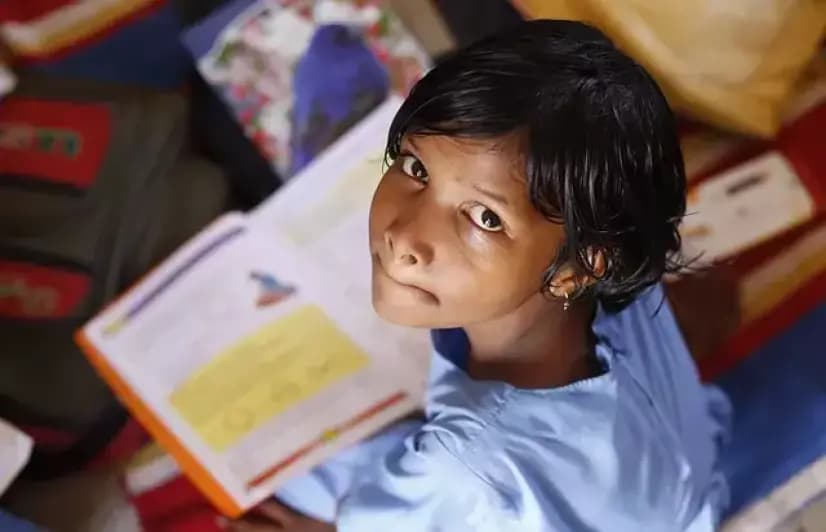
A Protector And Educator Rolled Into One
Kumhari, Madhya Pradesh: As you walk through the classrooms of the Government Higher Secondary School in Kumhari in Madhya Pradesh, it is hard to miss the person teaching in Khaki. As schools across the country are looking for innovative methods to educate the students, this school in Damoh district has the local Station House Officer (SHO) as a visiting faculty. Sub-inspector of Kumhari police station in Hata subdivision, BS Thakur, teaches the students while serving as a public servant. While the ever-increasing crime rates are a cause of concern, Thakur has managed to bring down the crime rate in the area and informs the younger generation of happenings in the world.Thakur’s career has seen a few shifts. He started as a teacher in a local school and then became Sarpanch before becoming a sub-inspector while continuing his stint as a visiting teacher in the local school.Om Lal Cole, the principal, said Thakur talks to the students about the law and order situation, which is very beneficial to the students.He has garnered a lot of respect among the students as well. Monika Yadav, a student of class 12, said Thakur takes a period every week to educate them and he speaks to them about traffic safety and national parks using mnemonic methods. Sometimes he takes two to three periods a week of 45 minutes each, she informed.As a police officer, he also speaks about the prevalence of crime and social evils in the society. In one of his classes, he spoke to the students on how to detect and avoid being scammed. Kirti Kurmi, a class 12 student, said Thakur talks to them about women empowerment and how to seek help using the toll-free numbers.Another class 12 student Anushree Jain said station in-charge Thakur speaks about addiction and substance abuse and how to tackle it. Dipanshu Jain, a student of class 12, said Thakur spoke to them about the rumours regarding child-lifting gangs. “As we learn new things, we go and share it with our family and pass on the information that is provided to us,” he said. RK Pateria, a teacher at the school, said SHO Thakur informs the students about important issues such as traffic safety, addiction and rumour of child-lifting gangs, which, he stated, helps the students grow up as balanced and well-rounded individuals.He added that few methods of teaching employed by Thakur help the students in other subjects such as Mathematics, History and Geography.BS Thakur said whenever he gets any extra time from his regular duties, he goes to the local school to interact with the students. He added that the children are the future and he tries to keep them updated about the crimes and some of the things he had learnt while he was preparing for the post of sub-inspector. He stated that since he has worked as a teacher before, the skill of teaching comes out in different forms.
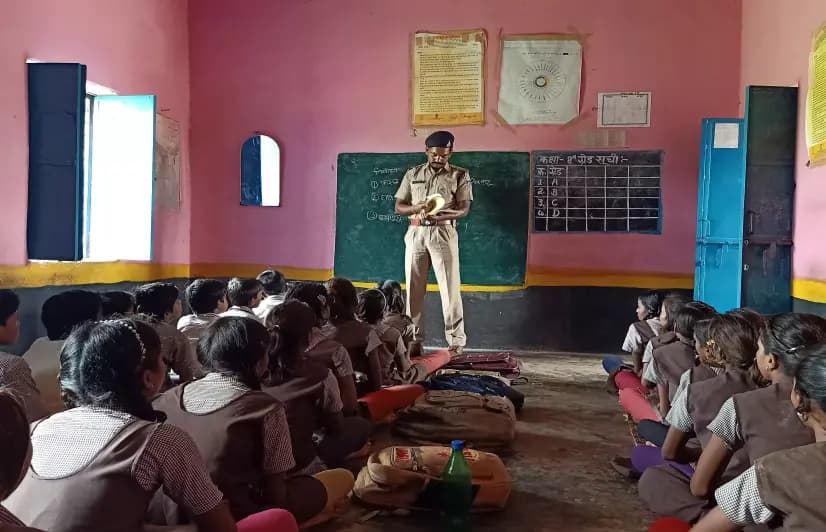
Write For 101Reporters
Follow Us On
101 Stories Around The Web
Explore All News